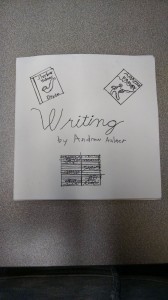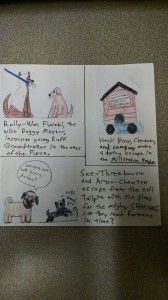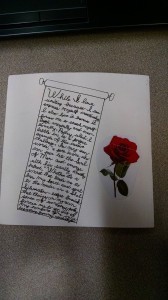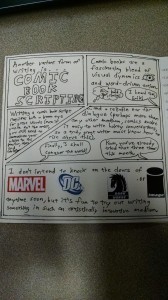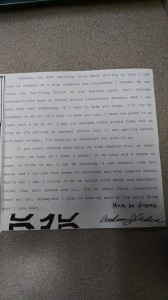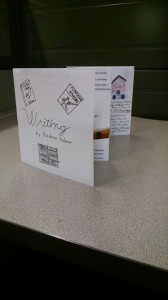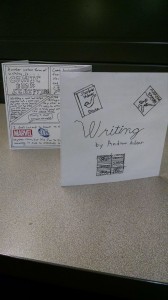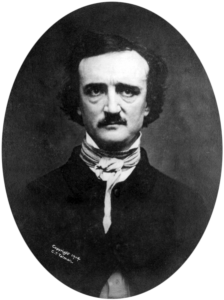Andrew J. Aulner's Blog, page 2
March 19, 2015
The Mystery of Screenwriting
Yesterday, we had a guest speaker in our Fundamentals of Fiction Writing class. He spoke about the basics of screenwriting–that is, writing scripts for film, television, and even video games. He explained, among other things, the most essential difference between writing prose or poetry and writing for the screen: the former favors descriptive words and insightful dialogue, while the latter relies on the use of action and visuals to tell the story.
In a novel or a short story, the author must describe everything, including what the faces of the characters look like, what the characters are wearing, what objects are occupying the current setting, how a character says a certain line of dialogue, and much more. Authors clue the readers in through descriptive language and imagery.
In a film, all of these elements, which are so essential to immersing the viewer into the world of the narrative, are conveyed through the work of the film’s director, costume designers, art directors, actors, cinematographers and hundreds of others. A single frame in a movie can convey as much as, or even more than, an entire page of prose.
Don’t believe me? I’ll show you.
Here’s an excerpt from the chapter “Shelob’s Lair” from J. R. R. Tolkien’s The Lord of the Rings: “Hardly had Sam hidden the light of the star-glass when she came. A little way ahead and to his left he saw suddenly, issuing from a black hole of shadow under the cliff, the most loathly shape that he had ever beheld, horrible beyond the horror of an evil dream. Most like a spider she was, but huger than the great hunting beasts, and more terrible than they because of the evil purpose in her remorseless eyes. Those same eyes that he had thought daunted and defeated, there they were lit with a fell light again, clustering in her out-thrust head. Great horns she had, and behind her short stalk-like neck was her huge swollen body, a vast bloated bag, swaying and sagging between her legs; its great bulk was black, blotched with livid marks, but the belly underneath was pale and luminous and gave forth a stench. Her legs were bent, with great knobbed joints high above her back, and hairs that stuck out like steel spines, and at each leg’s end there was a claw.”
And here’s a link to an image of Shelob from Peter Jackson’s film version: http://www.immersiononline.net/upload...
In a single instant, you are able to comprehend what it took Tolkien multiple paragraphs to convey. This is neither good nor bad; it is simply a difference in the medium that any writer must understand if he or she wants to write a screenplay. When writing a script, you don’t have to describe things in minute detail the way that you’re expected to in a novel or short story. There are plenty of other people who will bring that imagery to life; your job as the writer is to present the story and the dialogue in a way that translates well to a visual medium.
I’m a prose author, but that doesn’t stop me from dabbling in screenwriting. My scripts currently leave much to be desired, but I won’t be dissuaded from at least experimenting with this unique form of writing. I hope you’ll feel the same way.
March 12, 2015
My Writing Passion (The Codex Version)
Back in ancient times, scribes of the Maya civilization drew images of deities and wrote a breadth of information down on codices, folding books that allowed for easy sectioning of material. While only three codices have been completely authenticated and preserved for viewing by the modern world, these books have revealed much about the culture, beliefs, and society of these Mesoamerican people.
“That’s great, Andrew,” you may be thinking, “but why should I care?”
To keep the explanation brief, I’ll simply say that my Honors Art Appreciation professor assigned each student the task of writing and essay and creating a codex about one of the primary factors of our identities, something that has defined and influenced each of us throughout our lives. Naturally, I made a book about writing.
The cover page features the title (“Writing,” written in cursive, ick), as well as the cover of a Sherlock Holmes collection, displaying the detective’s classic pipe; the iconic Amazing Fantasy #15, which debuted the Amazing Spider-Man; and a composition notebook with writing all over it, the trademark of an active writer.
The second and third pages explain why writing is important to me and how the symbol I chose–in this case, a classic No. 2 pencil–represents the topic.
At the top of the page are these words: “To appropriate a popular idiom, I believe that the pencil is mightier than the sword. With this instrument, I can create new worlds or fell mighty beasts, construct fantastic vessels or destroy ancient structures. All my life, I’ve loved imagining and creating through storytelling. Nothing symbolizes that passion better than this pencil, the most essential of writing implements. Not only can I use it to write anything I choose into being, but if I make a mistake—or a dozen or a hundred—I can simply erase and start over. The beauty of writing is that I don’t have to get it right on the first try. Writing reflects my desire to improve; I’m not just putting something into existence with the writing end of the pencil, but I’m also using the eraser to fix my mistakes and move on from them.”
On the left, the tip of the pencil writes, “The pencil giveth…” and at the other end, the words continue, “…and the pencil taketh a–” only to be cut off mid-word by the eraser, which has removed the final word of the sentence. I originally cut up a pink twisty-tie and taped them below to represent eraser shavings, but they must have fallen off when my teacher graded the codex.
Below the pencil imagery is the remainder of this first part of my essay: “The pencil cuts through the text like a ship sailing through the water because, as much as I enjoy making an impression with my work, I love moving on to other projects just as much. There are countless ports to sail to, or in this case, stories to be written. Just like the starship Enterprise, boldly going where no man has gone before, I savor using my pencil to boldly explore depths of the imagination that have not yet been discovered.”
The next two pages are dedicated to a story that highlights an instance of writing in my life. For the first part, I transcribed my essay in pen: “One of the best writing experiences of my life was an assignment in my high school “Creative Writing” class. Our teacher tasked us with writing and illustrating our own picture books. I may know my way around a paragraph, but I couldn’t draw my way out of a paper bag. So, with my teacher’s approval, I contracted one of my best friends to do the illustrations in exchange for energy drinks. However, the writing was all on me. I had to come up with a story that was fun, engaging, and memorable, all in the span of a few dozen pages!
“Like any good writer, I decided to borrow from one of the greats. I took the tale of Star Wars, one of my all-time favorite stories, and gave it my own spin by combining all of the characters with various breeds of dogs; Luke Skywalker became Ruff Groundtrotter the Labrador Retriever, See-Threepio became See-Threebowow the Chihuahua, and so on. By taking a timeless story and its instantly recognizable characters and putting my own creative stamp on them, I was able to put something new into the world while paying homage to a classic saga.”
Here are photocopies of a few images from the aforementioned picture book, which I eventually titled Bark Wars. Taylor Penn drew the images, and I wrote the captions shown here. In the upper left, “Rolly-Wan Furobi, the wise Doggy Master, instructs young Ruff Groundtrotter in the ways of the Furce.” At the right, “Hank Boxo, Chewbarka, and company make a daring escape in the Millennium Beagle.” And finally, at the bottom, “See-Threebowow and Artoo-Chewtoo escape from the evil Tailpire with the plans for the mighty SHOT-VAC; can they reach Pawtooine in time?”
This page takes us to the reverse side of the codex. I drew a scroll, wrote the text below in an attempt to explain my occasional forays into poetry, and added a cutout of a rose, because, you know, those are pretty poetic, right?
“While I love writing because I can express myself creatively, I also love it because it forces me to stretch myself both mentally and emotionally. Poetry, which I dabble in, is a perfect example of this creative challenge. In my own words, “a poet is one who can peer into the soul of Man and emerge with his sanity mostly intact.” Whether it’s a sonnet that leads me to bare my heart and soul or a Shel Silverstein-esque limerick that thrives on my own sense of wordplay, poetry forces me to get out of my comfort zone in a departure from my usual style.”
Here we have my take on another artistic medium that hinges upon writing: the comic book. For this page, I drew some comic book panels, wrote in this portion of my essay, added some snappy hand-drawn images, and used the company logos in place of the comic book publisher names at the very bottom of the page. I like to think it was a pretty nifty effect.
“Another variant form of writing is comic book scripting. Comic books are a fascinating blend of visual dynamics and word-driven action. Writing a comic book script requires both a keen eye for great visuals (even if you’re not the artist, you still need to communicate your vision to the penciler, the inker, and the colorist) and a reliable ear for dialogue (perhaps more than any other medium, comics make it easy to write hokey conversations, so a truly great writer must know how to rise above this). I don’t intend to knock on the doors of Marvel, DC, Dark Horse, Image, or IDW anytime soon, but it’s fun to try out writing something in such an artistically innovative medium.”
And now we reach the final page, in which I wax and wane poetic about my love of writing and the surge of energy and effort that it grants me.
“Possibly the most exciting thing about writing is that I can take my readers on a trip anywhere and everywhere I choose. We can visit the far-flung future or the distant past, sail through monster-filled seas or travel across treacherous deserts. And I can make them feel something. If I want to make you laugh, I’ll try my darndest to do so. If I want to make you cry, I have the power to at least have a go at it. I may not succeed every single time, but as long as I’m putting an earnest effort into it and getting better with each attempt, I’m creating an adventure for both of us.
“If you learn nothing else about me from reading this, at least know this: as long as I have a pencil in my hand and a piece of paper in front of me, I can do anything. I can control time and space, and I can use that power to entertain and even inspire others. That’s who I am; I strive to be an artist with words and parchment rather than with canvas and oil. I’m no Nobel Prize laureate—at least not yet, anyway—but I plan to make my mark on the world doing what I love most.”
At the bottom and a bit to the left, I drew the Aurabesh (read: Star Wars alphabet) characters for my initials (A.J.A.) and finished both the essay and the codes by signing my name under the line, “Here be dragons.”
I’ll end this post with some beauty shots of the codex as it was meant to be, folded so it can be read from multiple angles. I hope this codex piqued your interest and perhaps even shed some light on the life of this writer. Take care.
February 26, 2015
Writing About Writing Part Four: C. S. Lewis
I guess this whole “blog post a day late” thing has become a bit of an issue, hasn’t it? With that in mind, I have decided that my future posts will be released on Thursdays rather than Wednesdays. I think I will be able to achieve a higher level of consistency with that schedule in place.
Now that I’ve taken care of that little bit of housecleaning, let’s move on to the main event with the final quote of this month’s “Writing About Writing” series.
“You can make anything by writing.”–C. S. Lewis
C. S. Lewis had a storied career as both a successful fiction writer and as a Christian apologist. Though Lewis spent much of his life as a militant atheist, he eventually became a devoted member of the Church of England thanks to his longtime friendship with fellow writer J. R. R. Tolkien. Throughout his career, Lewis combined his own imagination with religious influences to write about adventures on far-off planets, correspondence between senior and junior demons, and most famously, a magical realm familiar to millions of readers around the world: Narnia.
Lewis believed in the vast potential of human imagination because of the inspiration given to us by our Creator. In fact, P. L. Travers (author of the Mary Poppins series) once stated in an interview with The Paris Review that Lewis believed “there’s no such thing as creative writing…there is, in fact, only one Creator and we mix. That’s our function, to mix the elements He has given us.”
Regardless of your religious faith, surely you can embrace the exciting possibilities which the human writer possesses. As long as we’re willing to open up our minds and our hearts, we can take our readers anytime and anywhere. We can tell stories of dashing heroes and terrible villains or outrageous adventures and daring escapes. We can give the readers an exciting story that could only exist in the most incredible of circumstances, or we can tell them a tale that could unfold on Main Street, USA. There is no limit to what we can write.
Do you want to make your readers cry? Do you want to make them laugh? Do you want to make them stand up out of their chairs and cheer? Then go to it! You’re a writer, and that gives you the power to make anything!
February 19, 2015
Writing About Writing Part Three: Stephen King
No excuses for being a day late this week. We’re just jumping straight in.
“If you don’t have time to read, you don’t have the time (or the tools) to write. Simple as that.”–Stephen King, On Writing: A Memoir of the Craft
In his very excellent On Writing, Stephen King explained the importance of reading in any writer’s life. Mr. King himself claims to read about seventy to eighty books a year and yet considers himself “a slow reader.” I read about half of that in a year, although I’m hoping to up the ante by increasing my habit of listening to audiobooks in the car and over lunch when I’m by myself.
What’s important isn’t necessarily the sheer quantity of material read, but rather the quality. It’s imperative for aspiring writers to read good books to understand what works in a novel and bad books to understand what doesn’t. It can be hard to appreciate just how annoying clichés like “a face as red as a tomato” or “meanwhile, back at the ranch” are until you’ve actually read something that’s overflowing with such hackneyed phrases.
Apart from a desire to improve your writing, you should read because it’s just so gosh-darn fun to get absorbed in a great story, dazzled by a particular author’s flair for wordplay, and overwhelmed by the emotions conjured up by a masterful writer. In another great piece of advice from On Writing, King says, “You cannot hope to sweep someone else away by the force of your writing until it has been done to you.” This is something that can’t be taught abstractly. It must be something that you have personally experienced, and that experience won’t come unless you pick up a book and start reading.
So shell out a few bucks at a bookstore, check out Overdrive.com for tons of free e-books and audiobooks, or simply visit your local library to start your journey as a reading writer.
February 12, 2015
Writing About Writing Part Two: Anton Chekov
I know, I know, I’m a day late on my blog post, but there were…extenuating circumstances. Anyway, I am glad to be back, ready to give you another quote about the fine craft of writing.
“Don’t tell me the moon is shining; show me the glint of light on broken glass.”–Anton Chekhov, abbreviated quote translated from a letter to his brother, Alexander
A renowned Russian playwright and author famed for his short stories, Anton Chekhov speaks here about perhaps the greatest of all writer maxims: “show, don’t tell.” Readers expect a considerable amount of detail that will allow them to fully envision what the writer wants to depict, and they want this detail to be interesting and creative rather than dull and cliché.
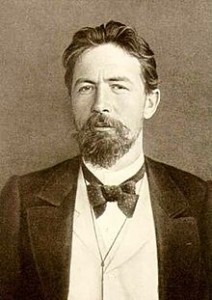
Chekhov was a master of description. (PD-1923)
Imagine you’re reading a Tom Clancy novel, perhaps a scene where a terrorist prepares to fire his weapon at the hero. Does the prose of the late, great Tom Clancy simply say, “The terrorist prepared to fire his gun” and leave it at that? Heck no! You can expect the novel to go into well-researched detail about the terrorist’s motivation, the specifications of the rifle he’s using, the amount of training required to become an expert shot with such a weapon, and so forth. Suddenly, what started as a bland, bare-bones sentence turns into a paragraph chock-full of juicy details, a description that gives the readers a wonderful picture of the scene and whets their appetites for the action to come.
Don’t mistake the desire for description for an excuse to use flowery prose. Readers don’t want to stumble their way through a page full of ten-dollar words and pretentious phrases. If it suits the nature of the scene to write, “The dog bit the man,” leave it at that. Don’t spend a page detailing the gush of blood, the frenzied look in the dog’s eyes, or the man’s screams of pains. Devote a paragraph, perhaps even two or three, to giving the intimate details of the attack, but no more. Too much description will bog down the flow of the scene and leave the reader setting your work aside in favor of some lighter fare.
So be on guard against simply telling the action in a boring fashion, but don’t be afraid to hold back unnecessarily fancy words like “vagaries” and “expunging” if the narrative allows. Find that sweet spot, and your readers will be in for a treat.
February 4, 2015
Writing About Writing Part One: Anne Lamott
Greetings, dear readers! I am doing a series this month in which I will write one post every Wednesday about writers saying memorable things about writing. I hope this will give you a greater insight into the world of authors, poets, playwrights, and other members of the writing breed.
“Almost all good writing begins with terrible first efforts. You need to start somewhere.”–Anne Lamott, Bird by Bird
This first quote about writing is by Anne Lamott, an author of both fiction novels and nonfiction books. I love it because it captures the frustrations and struggles of all writers, especially the young, up-and-coming ones. Many people may think that writers have some sort of innate ability to write brilliant stories and perfect poems on the first try, forgetting that the great successes in any field got to be that way through practice and tenacity.
Few, if any, notable writers are masters right from the start. Even the greatest novels, poems, shorts stories, play scripts, and screenplays started out as rough drafts that required countless hours of polishing and revision. For example, George Lucas’s script for Star Wars went through at least four drafts before production on the movie started, and Lucas continued to hack away at the piece during almost the entire filming process. The first draft, though very creative and original in its own way, is almost completely unrecognizable next to the finished product.
Daguerreotype taken by Edwin H. Manchester on November 9th, 1848. {{PD-1923}}
Another great example of rough beginnings is Edgar Allan Poe, whose first professional foray into creative writing, an anonymously published collection entitled Tamerlane and Other Poems (1827), failed to receive any contemporary critical or commercial attention. It wasn’t until the publication of his third book, Poems (1831), that Poe was able to write for a living, and he didn’t become a household name until he wrote “The Raven” thirteen years later.
I know from my own personal experience that nothing can make a writer laugh harder than rereading a first draft. Here is an excerpt from the rough draft of The Bully Buster, transcribed exactly as I wrote it in my now-tattered notebook: “At first, I thought becoming a superhero was a good idea, but then I thought ‘realisticly’, as my dad says. How could a weak, puny 5th grader become a heroic superhero?”
While I shouldn’t be too hard on myself–I was twelve years old when I wrote this, after all–it still cracks me up to read the spelling and punctuation errors, simplistic structure, and redundant ending of this brief snippet from the first draft of my novel. If this doesn’t prove that aspiring authors don’t have a rough go at it their first time around, I don’t know what will.
Although I used the quote from Anne Lamott apropos of the realm of writing, it applies to almost any part of the human experience. Wherever your path takes you, it’s helpful to remember your rough beginnings.
January 23, 2015
Movie Reviews
I wrote somewhat extensively about the movies I am looking forward to seeing this year in my previous post, “Onward to Victory in the New Year.” This, coupled with the fact that I just uploaded a YouTube video of my picks for the top 10 movies of 2014 (https://www.youtube.com/watch?v=-F9np...), has made me realize that I can use this blog not only as a platform to write about being an author, but also to write about another one of my passions: film!
From now on, whenever I go to see a movie in theaters, I will write and post a review for all to see on this blog, so that you may better understand my views on narratives and my likes and dislikes both as a member of the general public and as a critical thinker regarding narrative structure. I hope you will enjoy the reviews that will be coming throughout this year.
January 8, 2015
Onward to Victory in the New Year
Another year has come and gone. As I said in my last blog post, I experienced both highs and lows in 2014. I hope to experience even greater success and endure potential failure with just as much resilience this year. Like every new year (except for leap years, of course), 2015 offers 365 days of possibilities and opportunities.
I’m looking forward to a lot of things this time around. For example, I’m greatly anticipating the release of films like The Avengers: Age of Ultron (hopefully, Joss Whedon and Co. can recreate their 2012 critical and commercial success), Jurassic World (I’ve seen every movie in the series, so I’m curious to see how the filmmakers will reinvent the “people trapped on an island filled with dinosaurs” scenario), Terminator Genisys (the premise sounds interesting, although the spelling in the title does great violence to my eyes), Ant-Man (I’ve always enjoyed the Ant-Man character), the Fantastic Four reboot (Marvel’s original family gets a second chance at having a good series on the Silver Screen), The Peanuts Movie (I loved the comic strips as a kid), and, most of all, drumroll please….Star Wars Episode VII: The Force Awakens (I love Star Wars as much as Nebraska loves college football, so hopefully you can understand the extent of my passion for that galaxy far, far away).
I’m also looking forward to my nineteenth birthday, which will finally make me a legal adult in the state of Nebraska, and I can’t wait to see what the end of my freshman year and the beginning of my sophomore year at UNO has in store for me.
Some of my goals for this year include getting a better handle on my emotions—any man worth his salt ought to when it is and isn’t appropriate to express his sensitive side—get more in touch with nature, start saving up money for retirement, read at least thirty-five books, learn a new skill or hobby, sell a couple hundred copies of The Bully Buster, have some of my writings (e.g. short stories, poems) published in professional magazines, run an “extreme 5K” (http://goo.gl/9r6RE5), go to the upcoming O Comic Con Venue in Council Bluffs, and build a closer relationship with God.
How about you, dear reader? What goals have you set for yourself for this year? And how will you go about accomplishing them? I can’t wait to see what 2015 has in store for all of us.
December 25, 2014
Merry Christmas and a Happy New Year!
I hate to be sitting in front of my computer while my family is all at home, but I haven’t blogged in a while and I wanted to “get ‘er done” on Christmas Day itself. I want to wish you all a merry Christmas and a happy New Year, and, as they often say across the pond, many happy returns.
This has been quite a year for me. Some of the big events include captaining the Quiz Bowl team that won the Nebraska State Championship, reading the entire Harry Potter series for the first time in just under two months, graduating from Elkhorn High School, getting my novel (“The Bully Buster”) published, moving to the customer service department at my job at Hy-Vee, beginning my life as a student at the University of Nebraska at Omaha, and “winning” NaNoWriMo for the first time ever.
There have been quite a few ups and downs this year, but I am thankful and blessed to say that the good times have far outweighed the bad ones. I have received many great opportunities, I am surrounded by loving and supportive friends and family members whom I cherish, and most importantly, I’m serving a God who loves me despite my many failings and setbacks. ‘Tis the season to remember that He sent His only Son, Jesus Christ, to die for us, and that’s why we celebrate this Christmas season. I know it’s easy to forget that during the hustle and bustle of daily life, especially during the holiday season, but I know that remembering what God did for us and thanking Him for it brings Him delight.
So as Judy Garland sang in “Have Yourself a Merry Little Christmas” (one of my all-time favorites), be happy that “faithful friends who are dear to us will be near to us once more.” Take comfort in your loved ones here on Earth and in heaven, and have a very merry Christmas.
November 30, 2014
NaNoWriMo 2014: Victory!
This is a short post.
How come? Well, my brain is mostly fried from the writing I did to finish up my NaNoWriMo novel. I just want to celebrate for a moment the fact that I did what I thought would be impossible; I wrote over 50,000 in a mere 30 days, all while balancing school, work, and time with family (especially imperative during the Thanksgiving holiday). Literally thousands of other people of done it, and I’m sure anyone reading this could do it too if they really put their minds to it, but it feels nice to have accomplished this.
The book’s tentative title is “The Strange Case of the Trial of Man,” although I’m not *too* fond of it and will try to come up with something better later on. However, I’m setting the manuscript aside until January at the earliest to give my writing mind a chance to cool off. This is the last I’ll talk of it online for a while. Like I said, I just wanted to make a statement about how excited I am to have met this goal and to have finally gotten back into the wonderful habit of regular writing again.

